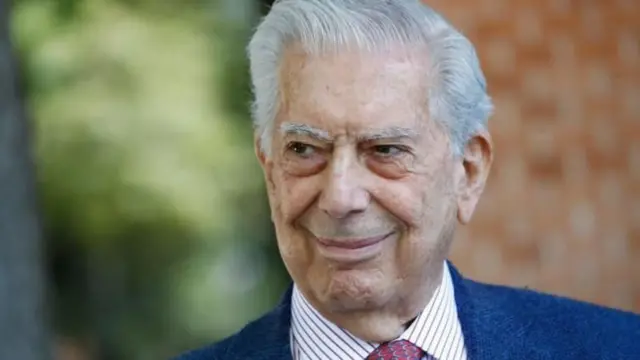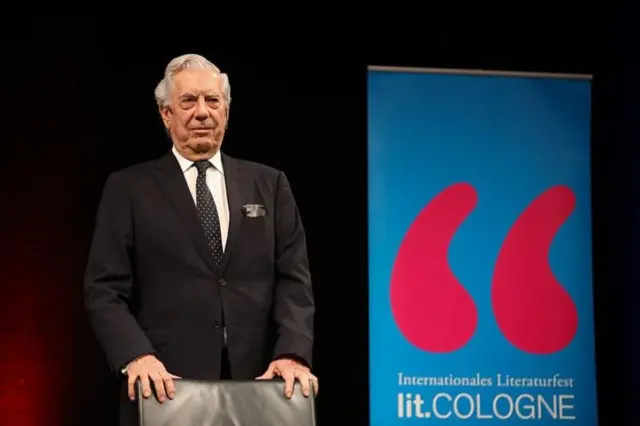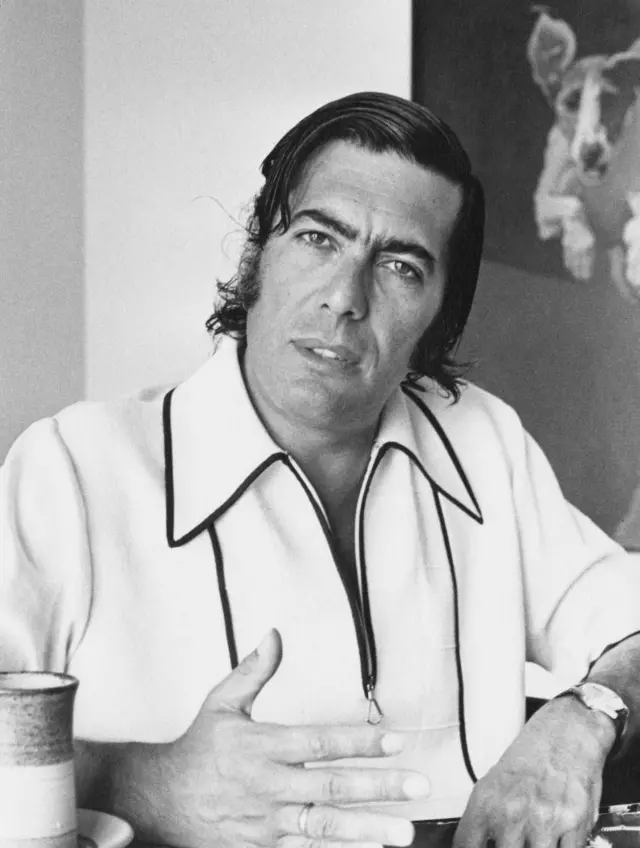Morre Vargas Llosa, prêmio Nobel e último gigante da geração dourada da literatura latino-americana

Mario Vargas Llosa, escritor peruano vencedor do Prêmio Nobel de Literatura em 2010, morreu neste domingo em Lima, aos 89 anos, segundo informaram seus filhos em um comunicado.
Vargas Llosa foi autor de obras marcantes da literatura latino-americana, como "A Festa do Bode", "Conversa no Catedral" e "A Guerra do Fim do Mundo".
"Sua partida entristecerá seus parentes, amigos e leitores, mas esperamos que encontrem consolo, como nós, no fato de que ele teve uma vida longa, múltipla e frutífera, e deixa para trás uma obra que o sobreviverá", disseram no comunicado os filhos do escritor, Álvaro, Gonzalo e Morgana.
"Agiremos nas próximas horas e dias de acordo com suas instruções. Não haverá nenhuma cerimônia pública. Nossa mãe, nossos filhos e nós mesmos esperamos ter o espaço e a privacidade para nos despedirmos em família e na companhia de amigos próximos. Seus restos mortais, como era sua vontade, serão cremados", acrescentaram.
Obra prolífica
Vargas Llosa soube desde muito jovem que queria ser escritor.
Fim do Matérias recomendadas
E a isso dedicou sua vida com a disciplina de um operário, até alcançar o reconhecimento universal como autor — e também uma divisão de opiniões em torno de sua figura pública que não se via no Ocidente desde a época do filósofo Jean-Paul Sartre.
Talvez não seja totalmente coincidência: Sartre foi um de seus primeiros modelos (os colegas de juventude o chamavam de "o pequeno Sartre corajoso") e, embora depois tenha criticado as ideias políticas do francês, até o fim foi um escritor engajado, comprometido com sua realidade, como pregava o famoso existencialista - Vargas Llosa chegou a ser candidato à presidência do Peru em 1990, mas perdeu para Alberto Fujimori.
Essa disciplina e compromisso o levaram a produzir uma obra de surpreendente abundância: 20 romances, um livro de contos, 10 peças de teatro, 14 livros de ensaio, dois de crônicas e um de memórias, além de múltiplas coletâneas de suas colunas e textos avulsos.
Jorge Mario Pedro Vargas Llosa nasceu em 28 de março de 1936, em Arequipa, no sul do Peru.
E embora sempre a tenha apontado como seu lugar de origem (e é lá que, na casa colonial onde nasceu, repousa sua biblioteca), viveu nela apenas um ano.
Em 1937, seu avô Pedro J. Llosa decidiu mudar-se para Cochabamba, na Bolívia, para administrar uma fazenda de algodão. Lá, cercado por mulheres e pela autoridade benigna do avô, Vargas Llosa viveu aquilo que ele próprio descreveu como uma espécie de paraíso.
A queda na realidade viria nove anos depois, quando a família materna retornou para viver no Peru, desta vez na cidade de Piura, onde seu avô foi nomeado prefeito.
A figura paterna
O que aconteceu em Piura foi um dos eventos fundamentais de sua vida — tanto que é com ele que começa "Peixe na Água", o mais próximo de uma autobiografia que Vargas Llosa chegou a escrever.
"Minha mãe me pegou pelo braço e me levou para a rua pela porta de serviço da prefeitura. Caminhamos em direção ao Malecón Eguiguren. Eram os últimos dias de 1946 ou os primeiros de 1947, pois já havíamos feito as provas no Salesiano, eu havia terminado a quinta série primária e já era verão em Piura, com sua luz branca e um calor sufocante.
— Você já sabe, é claro — disse minha mãe, sem que sua voz tremesse. — Não é verdade?
— O quê?
— Que seu pai não está morto. Não é verdade?
— Claro. Claro que sim.
Mas eu não sabia. Nem remotamente suspeitava."
Ernesto Vargas, o homem que havia abandonado a mãe do futuro escritor poucos meses antes de seu nascimento, estava de volta para ocupar seu lugar patriarcal no centro da família.
E como ocupou: naquele mesmo dia, sem sequer avisar à família de sua esposa, Dora, levou todos para viver em Lima, capital peruana.
É possível que a pulsão de Mario, o escritor, tenha nascido ali — na luta descomunal e desigual de vontades que se iniciou entre aquele menino e seu pai tirânico.
Lima, detestável
Também em "Peixe na Água", Vargas Llosa conta que detestou Lima desde o primeiro momento e se refugiou nas revistas em quadrinhos e nos romances de aventura de Júlio Verne, Emilio Salgari e Karl May.
Quando Mario tinha 14 anos, seu pai cumpriu a ameaça de colocá-lo num colégio militar, o Leoncio Prado. Lá, passaria quatro anos e, ao contrário do que seu pai desejava, enfrentaria um microcosmo do que era o Peru — com jovens de todas as classes sociais e raças do país — além da tremenda violência que emergia desses encontros. E foi isso que o convenceu de seu desejo mais íntimo: ser escritor.
Sobre sua experiência no colégio militar, escreveria, aos 26 anos, seu primeiro romance: "A Cidade e os Cachorros", que não apenas o lançaria à fama como também inauguraria o movimento literário com o qual seria identificado por toda a vida: o boom da literatura latino-americana.
Mas isso viria um pouco mais tarde. Antes haveria a experiência completa de Lima (com um breve intervalo em Piura para concluir o ensino médio, escrever sua primeira peça de teatro, A Fuga do Inca, e trabalhar na editoria policial de um jornal), cidade que já não lhe pareceria tão detestável.
Na capital, trabalhou em jornais e como assistente de um historiador, estudou Direito e Literatura na Universidade de San Marcos, foi brevemente membro do Partido Comunista (então proibido) no Peru e ganhou uma viagem de 15 dias a Paris pelo conto O Desafio, que integra seu único livro de contos, "Os Chefes".
Foi nesse período que conheceu a obra de José Carlos Mariátegui, Karl Marx e Sartre — fundamentais para sua formação política inicial — e também a do norte-americano William Faulkner, que o marcou profundamente por sua técnica narrativa prodigiosa. Leu também com avidez Alexandre Dumas, Victor Hugo e Gustave Flaubert, outro de seus grandes mestres.
Foi também nessa época que, num ato de rebeldia tribal, casou-se, aos 19 anos, com sua tia materna, Julia Urquidi, 11 anos mais velha e divorciada.
Da relação com ela e de seu trabalho na Rádio Panamericana surgiria um de seus romances mais bem-sucedidos e divertidos: "A Tia Júlia e o Escrevinhador". Da experiência em Lima durante a ditadura do general Manuel Odría viria a monumental Conversa no Catedral, e de Piura e duas estadias na Amazônia peruana, A Casa Verde.

Paris, Cuba
Em 1958, graças a uma bolsa de estudos, Vargas Llosa muda-se com Julia para Madri, onde pretende fazer um doutorado em literatura.
No entanto, permanece apenas um ano na Espanha e, ao término da bolsa, decide perseguir seu sonho de viver em Paris — um lugar mítico para escritores latino-americanos de sua geração (e das anteriores), como Julio Cortázar, Gabriel García Márquez, Carlos Fuentes, Octavio Paz, Alejo Carpentier e Severo Sarduy.
As condições em que vivia com a esposa no Hotel Wetter no bairro latino eram extremamente modestas. Trabalhou como professor de espanhol e, inclusive — segundo relata Julia Urquidi em seu livro "Lo que Varguitas No Dijo" (O que Varguitas não disse, em tradução livre) — atuou como escritor fantasma para uma senhora peruana que queria publicar suas experiências no Oriente Médio.
Tudo mudaria com a publicação, em 1963, de "A Cidade e os Cachorros" (vencedor do Prêmio Biblioteca Breve da editora Seix Barral em 1962), que lhe traria fama internacional e repúdio local: centenas de exemplares do livro foram queimados pelos militares no colégio Leoncio Prado, por considerarem que a obra havia manchado a reputação da instituição.
Já mais bem estabelecido na França — embora com o casamento em crise — e trabalhando na rádio e televisão francesa, Vargas Llosa começou a escrever seu segundo romance, "A Casa Verde", onde aparece pela segunda vez (a primeira havia sido em um conto) o sargento Lituma.
Foi nessa época que passou a apoiar plenamente a Revolução Cubana, para onde havia viajado algumas vezes como jornalista.
"Para a minha geração, e não só na América Latina, o que aconteceu em Cuba foi decisivo — um antes e um depois ideológico. Muitos, como eu, viram na gesta fidelista não apenas uma aventura heróica e generosa, de combatentes idealistas que queriam não só acabar com uma ditadura corrupta como a de Batista, mas também construir um socialismo não sectário, que permitisse a crítica, a diversidade e até a dissidência", escreveria no prólogo de seu livro de ensaios O Chamado da Tribo.
Também foi o período em que estreitou laços com outros escritores latino-americanos que começavam a despontar, como Carlos Fuentes (Julio Cortázar ele já conhecia de antes — o argentino inclusive leu "A Cidade e os Cachorros" antes mesmo de sua publicação).
"A Casa Verde" — ambientado na selva amazônica e em um prostíbulo em Piura, e onde Vargas Llosa demonstra seu extraordinário domínio da técnica romanesca moderna — foi sua consagração definitiva. Publicado em 1966, venceu o Prêmio Rómulo Gallegos em 1967.
Em seu discurso de aceitação do prêmio, delineou o que seria seu credo literário:
"A vocação literária nasce do desacordo de um homem com o mundo, da intuição de deficiências, vazios e impurezas ao seu redor. A literatura é uma forma de insurreição permanente e ela não admite camisas de força."
O mesmo poderiam ter dito vários colegas obcecados pela literatura que, paralelamente a Vargas Llosa, buscavam escrever romances totais — que não apenas complementassem a realidade, mas rivalizassem com ela.
E em 1967 foi publicado um desses romances:"Cem Anos de Solidão", do colombiano Gabriel García Márquez — a locomotiva que pôs em marcha o trem imparável do boom da literatura latino-americana, como batizou o movimento o crítico chileno-americano Luis Harss.
Foi precisamente em agosto daquele ano, durante a entrega do Prêmio Rómulo Gallegos em Caracas, que Vargas Llosa e García Márquez se conheceram e iniciaram uma profunda amizade — que terminaria de forma explosiva em fevereiro de 1976, na Cidade do México.
Ascenção e queda do boom latino-americano
Foram os anos dourados do "Boom", ao qual pertenceram formalmente apenas Cortázar, Carlos Fuentes, Vargas Llosa e García Márquez.
Se a grande literatura da primeira metade do século XX pertenceu aos Estados Unidos, a latino-americana foi o grande fenômeno da segunda metade do século — e não apenas serviu de impulso para consolidar escritores como o chileno Jorge Donoso ou o cubano Guillermo Cabrera Infante.
O apetite que se despertou pela literatura da América Latina foi tão grande que também ajudou a redescobrir, para um público mais amplo, mestres mais antigos como o argentino Jorge Luis Borges, o uruguaio Juan Carlos Onetti, o mexicano Juan Rulfo, o paraguaio Augusto Roa Bastos e o cubano Alejo Carpentier.
Nesse mesmo ano milagroso de 1967, Vargas Llosa (já casado com sua prima Patricia Llosa) mudou-se para Londres, onde exerceu várias atividades (ainda não podia viver apenas dos direitos autorais), sendo a principal delas lecionar literatura no Queen Mary's College. Também atuou ocasionalmente como colaborador do Serviço Latino-Americano da BBC — o que hoje é a BBC Mundo.
Paralelamente, trabalhava em seu romance mais ambicioso até então: "Conversa no Catedral".
Foi então que surgiu uma proposta irrecusável: a superagente literária Carmen Balcells lhe ofereceu a chance de se mudar para Barcelona, comprometendo-se a fazer com que ele pudesse viver exclusivamente de sua escrita.
Assim, a família Vargas Llosa acabou morando na rua Caponata, na capital catalã, praticamente parede com parede com os García Márquez.
Era tamanha a fascinação de Vargas Llosa por García Márquez que ele dedicou dois anos à escrita de um livro sobre "Cem Anos de Solidão" (que também serviu como tese para o doutorado que não havia concluído), intitulado "García Márquez: História de um Deicídio" — o primeiro grande texto crítico dedicado à obra do colombiano.
O começo do fim do "Boom", da amizade utópica entre esse grupo de escritores e do compromisso de alguns deles com a Revolução Cubana, começou a se delinear em Paris, em 1971.
E justamente dentro de um projeto que prometia se concretizar.
Impulsionados pelo espanhol Juan Goytisolo e financiados por uma rica herdeira boliviano-francesa, alguns dos escritores latino-americanos mais renomados se reuniram para editar, a partir de Paris, a revista de esquerda Libre.
Lá estariam os quatro principais nomes do "Boom", além de Octavio Paz, José Donoso, Severo Sarduy e Jorge Edwards.

A história completa está narrada em detalhes no quarto capítulo do livro "En los Reinos de Taifa", de Juan Goytisolo: o primeiro número da revista "Libre" já estava pronto para ser impresso quando foi divulgado, em Cuba, o chamado "Caso Padilla".
Heberto Padilla era um poeta cubano que havia participado ativamente da Revoluçã Cubana e inclusive chegado a ocupar o cargo de vice-ministro do Comércio Exterior. No entanto, no final dos anos 1960, passou a criticar abertamente a política cultural do governo.
Em março de 1971, foi preso e, pouco depois, veio a público uma "confissão" caricatural, que lembrava os julgamentos stalinistas, provocando a fúria de muitos escritores estrangeiros amigos da Revolução.
Liderados por Goytisolo e Vargas Llosa, vários intelectuais e escritores (incluindo Sartre, Susan Sontag, Italo Calvino, Simone de Beauvoir, Octavio Paz, Alberto Moravia e Marguerite Duras) enviaram duas cartas a Fidel Castro em apoio a Padilla — o que enfureceu o comandante-em-chefe, que pronunciou um duro discurso contra os signatários e os proibiu de entrar em Cuba "por um tempo indefinido e infinito".
O primeiro número da "Libre" foi adiado até o outono para incluir um dossiê completo sobre o caso Padilla, com diferentes pontos de vista — inclusive um poema de Julio Cortázar, no qual ele se distanciava completamente das críticas ao governo cubano.
Esgotada pela falta de recursos e pelas divisões internas, a revista só conseguiu publicar quatro edições. Mas isso não significou o fim imediato do "Boom". Vargas Llosa continuou amigo de Julio Cortázar até a morte do argentino, em 1983, e manteve sua amizade com García Márquez enquanto ambos viveram na Espanha.
A amizade entre os dois escritores terminou em 1976, no Palácio de Belas Artes da Cidade do México, no dia da estreia do filme "Os Sobreviventes dos Andes", quando Vargas Llosa deu um soco em García Márquez — aparentemente por um desentendimento amoroso, sobre o qual nenhum dos dois quis falar enquanto viveram.
Etapa cômica, erótica e histórica
Talvez seja coincidência, mas depois de sua ruptura pública com a Revolução Cubana, a escrita de Vargas Llosa passou por uma mudança: ele começou a experimentar com o humor.
Desse período surgiram as comédias "Pantaleão e as Visitadoras" (1973) e "Tia Julia e o Escrevinhador" (1977), ambas com grande sucesso de público.
Em 1981, o escritor voltou a surpreender com sua primeira — e ambiciosa — novela histórica: "A Guerra do Fim do Mundo", um retorno à chamada "novela total", na qual relata a sangrenta rebelião religiosa ocorrida em 1897, em Canudos, no Brasil, liderada pelo messiânico Antônio Conselheiro.
Mais adiante voltaria ao romance histórico com "O Paraíso na Outra Esquina" (2003) e "O Sonho do Celta" (2010).
A etapa seguinte de sua literatura seria a erótica, iniciada com a novela curta "Elogio da Madrasta" (1988) e continuada em obras como "Os Cadernos de Dom Rigoberto" (1997) e "Travessuras da Menina Má" (2006).
No entanto, a mudança mais profunda que ele experimentou não foi no plano literário, mas no político.
No final dos anos 1970, Mario Vargas Llosa voltou a residir em Londres, em circunstâncias muito diferentes: já era um autor consagrado, que podia viver daquilo que escrevia.
Foi uma fase fundamental: presenciou a ascensão de Margaret Thatcher ao poder e, ao mesmo tempo, leu — e chegou a conhecer — grandes pensadores liberais contemporâneos, como Isaiah Berlin e Karl Popper.
Em uma mudança ideológica profunda, ele adotou as ideias liberais e, desde então — assim como havia feito anteriormente com as ideias de esquerda — passou a defendê-las com unhas e dentes, tanto por escrito quanto em público.
Em 2019, quando o entrevistei pela última vez, ele continuava firme em suas convicções:
"O liberalismo está associado à ideia de liberdade e acredito que a defesa das liberdades é algo absolutamente essencial... Para o liberalismo, o essencial são as ideias, os valores, e dentro deles a ideia de liberdade é absolutamente central. Uma ideia que não pode ser dissociada, dividida ou fragmentada."
"A liberdade, segundo os liberais, é uma só e deve ser garantida simultaneamente no campo econômico, político, social e individual. E tudo o que signifique mais liberdade é bom para o conjunto da sociedade."
Não muito depois de sua conversão, ele teria a oportunidade de defender essas ideias na arena política.
Em agosto de 1987, quando o então presidente peruano Alan García anunciou que nacionalizaria os bancos e as companhias de seguros, Vargas Llosa — que estava de férias em seu país — decidiu se opor publicamente.
O sucesso de sua mobilização foi tal que o presidente acabou desistindo do plano de nacionalização, e o escritor decidiu lançar-se à presidência pelo movimento Frente Democrático.
No entanto, depois de um início de campanha promissor, o escritor transformado em político enfrentou em 1990 um fenômeno que primeiro o surpreendeu e depois o derrotou: Alberto Fujimori, que durante a campanha passou a caracterizar Vargas Llosa como um neoliberal rico de ultradireita.
Vargas Llosa retornou imediatamente à Europa para lamber as feridas e escrever "Peixe na Água", jurando nunca mais se envolver diretamente com a política.
Sua caracterização como neoliberal e ultradireitista se manteve ao longo dos anos, apesar de muitas de suas posições em temas sociais e políticos serem progressistas: defendia o aborto, a eutanásia, o casamento entre pessoas do mesmo sexo, a legalização das drogas e era crítico do tratamento dado por Israel aos palestinos.
Era, sim, um defensor ferrenho da democracia como sistema político e considerava o capitalismo, o livre mercado e a globalização como os melhores caminhos para tirar um país da pobreza.
E embora na entrevista à BBC Mundo já citada ele tenha ponderado dizendo: "Há quem acredite que o mercado resolve tudo, eu não acredito nisso, nem de longe, e tampouco acho que essa seja a essência do liberalismo", manteve até o fim sua admiração por Margaret Thatcher e Ronald Reagan, além de uma relação próxima com políticos conservadores da Espanha e da América Latina, como Álvaro Uribe, Sebastián Piñera e José María Aznar.

A festa do bode
Em 2000, quando ninguém esperava, Vargas Llosa voltou a publicar uma "grande novela" com "A Festa do Bode", que rivalizaria com seus maiores feitos na literatura, como "Conversa no Catedral" ou "A Guerra do Fim do Mundo".
Era o retorno do Vargas Llosa que mergulhava no calor dos grandes acontecimentos políticos e da violência. E também o retorno a um tema caro aos escritores latino-americanos: o caudilho transformado em ditador.
"Trujillo pertence àquela classe de ditadores que não apenas brutalizam e aterrorizam uma sociedade, mas chegam a seduzi-la. Conseguem se endeusar, e a maioria da população lhes presta culto", disse certa vez sobre o homem que controlou a República Dominicana por três décadas.
Foi, talvez, o último grande romance escrito por um integrante do "Boom", e é o mais admirado de Vargas Llosa no mundo anglófono.
Então, no dia 9 de outubro de 2010, quando Mario Vargas Llosa estava em Nova York dando um curso de literatura na Universidade de Princeton, chegou ao seu apartamento alugado o inevitável telefonema vindo da Suécia: ele havia vencido o Prêmio Nobel de Literatura daquele ano.
Era o que faltava, talvez, para imortalizá-lo. E, de quebra, para comprovar a relevância do "boom da literatura latino-americana" como algo mais do que um fenômeno comercial: é o único grupo literário da história que produziu dois prêmios Nobel.
Após um período em que publicou diversos ensaios e alguns romances menores, Vargas Llosa voltou às manchetes... mas das revistas de celebridades, pelas quais ele havia expressado desprezo em várias ocasiões: aos 79 anos, pôs fim a um relacionamento de meio século com Patricia para ir morar com a socialite espanhola Isabel Preysler, ex-esposa do cantor Julio Iglesias.
Desde então, não era incomum vê-lo nas capas de revistas como Hola. Nas poucas vezes em que falou sobre o assunto, explicou a decisão como resultado de um amor intenso, que pelo menos publicamente durou até dezembro de 2022, quando a separação do casal foi anunciada — dominando, mais uma vez, as capas da imprensa de celebridades.
Em 2022, aos 86 anos, ocupou a cadeira número 18 da Academia Francesa de Letras. Tornou-se, assim, o primeiro escritor que não havia publicado sua obra em francês a ocupar um posto nos quase 400 anos da ilustre academia.
Em 2023, publicou o que anunciou ser seu último romance: "Dedico a você meu silêncio". Também deixou de escrever sua coluna semanal, Piedra de Toque (Pedra de Toque), que manteve por décadas no jornal espanhol El País.
No momento de sua morte, Mario Vargas Llosa era o último representante de uma geração de gigantes que dominaram o cenário literário, intelectual e político da América Latina durante o século 20.
Nos últimos anos de sua vida, afirmou ser feliz.
Cinco obras imprescindíveis
- A Cidade e os Cachorros (1963)
- Conversa no Catedral (1969)
- Tia Julia e o Escrevinhador (1977)
- A Guerra do Fim do Mundo (1981)
- A Festa do Bode (2000)

